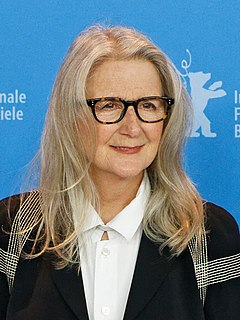Top 12 Quotes & Sayings by Sally Potter
Explore popular quotes and sayings by an English film director Sally Potter.
Last updated on April 15, 2025.
The language of cinema as it has evolved has also excluded vast swathes of human experience. The forms we find in the process of making a film can start to redress this balance and venture into uncharted territory. This is not just about unsung identities but about the subtleties and nuances of contemplation, the drifting spaces in which the worlds of the very small and the very large collide. Camerawork is a part of that.
Between the postwar fifties - domesticity, people happy to be alive after the Second World War, wanting to build a home, make a family, make a nest. Women were pushed back into the home after having been active in the Second World War. It was a big Doris Day moment for women, which didn't suit all women.
You can't really divorce women's struggles in the world from women's in the cinema. As long as there's hierarchy it means that women are somehow secondary or second class or less than. That's going to be reflected in movies because films are the most powerful medium to reflect back society's view of itself





















